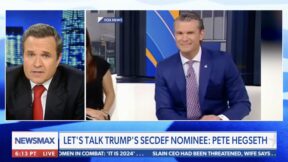JD Vance Refuses FIVE TIMES to Admit Trump Lost 2020 Election When Questioned By NYT
Screenshot via The New York Times.
Sen. JD Vance (R-OH) really did not want to answer a New York Times reporter’s question about former President Donald Trump losing the 2020 election, refusing to answer it a total of five times.
Vance sat down with Lulu Garcia-Navarro for the paper’s podcast The Interview, which will air in full on Saturday. The Times posted a three-minute clip Friday, in which Garcia-Navarro asked Vance repeatedly about his running mate’s ongoing denial of his 2020 loss.
The junior senator from Ohio’s recalcitrant attitude regarding the outcome of the election four years ago isn’t a new development; he offered a similar response during his debate with his Democratic counterpart, Minnesota Gov. Tim Walz, earlier this month.
Walz noted that Trump was “still saying he didn’t lose the election” and then directly asked Vance, “Did he lose the 2020 election?” Vance dodged the question and replied, “Tim, I’m focused on the future. Did Kamala Harris censor Americans from speaking their mind in the wake of the 2020 Covid situation?”
“That is a damning non-answer,” Walz fired back.
For the Times podcast, Garcia-Navarro brought up that debate moment.
“In the debate, you were asked to clarify if you believe Trump lost the 2020 election. Do you believe he lost the 2020 election?” she asked.
“I think that Donald Trump and I have both raised a number of issues with the 2020 election, but we’re focused on the future,” said Vance. “I think there’s an obsession here with focusing on 2020. I’m much more worried about what happened after 2020, which is a wide-open border, groceries that are unaffordable. And look—”
“Senator, yes or no?” Garcia-Navarro interjected. “Did Donald Trump lose the 2020 election?”
Instead of answering, Vance replied with his own question. “Let me ask you a question. Is it OK that big technology companies censored the Hunter Biden laptop story, which independent analysis have said cost Donald Trump millions of votes?”
Garcia-Navarro tried for a third time. “Senator Vance, I’m going to ask you again, did Donald Trump lose the 2020 election?”
He again replied with a question. “Did big technology companies censor a story that independent studies have suggested would have cost Trump millions of votes? I think that’s the question.”
Garcia-Navarro went for a fourth attempt. “Senator Vance, I’m going to ask you again. Did Donald Trump lose the 2020 election?”
“And I’ve answered your question with another question,” he replied. “You answer my question and I’ll answer yours.”
“I have asked this question repeatedly,” Garcia-Navarro persisted. “It is something that is very important for the American people to know. There is no proof, legal or otherwise, that Donald Trump did not lose the 2020 election.”
Vance again dodged the question, dismissing her question as a “slogan”:
You’re repeating a slogan rather than engaging with what I’m saying, which is that when our own technology firms engage in industrial scale censorship, by the way, backed up by the federal government, in a way that independent studies suggest affect the votes, I’m worried about Americans who feel like there were problems in 2020.
I’m not worried about this slogan that people throw, “Well, every court case went this way.” I’m talking about something very discrete: a problem of censorship in this country that I do think affected things in 2020, and more importantly, that led to Kamala Harris’s governance, which has screwed this country up in a big way.
Garcia-Navarro then asked him if he would have certified the 2020 election, and she did actually get a responsive answer after a few attempts.
GARCIA-NAVARRO: Senator, would you have certified the election in 2020, yes or no?
VANCE: I’ve said that I would have voted against certification because of the concern that I just raised. I think that when you have technology companies —
GARCIA-NAVARRO: The answer is no.
VANCE: When you have technology companies censoring Americans at a mass scale in a way that, again, independent studies have suggested affect the vote, I think that it’s right to protest against that, to criticize that. And that’s a totally reasonable thing.
GARCIA-NAVARRO: So the answer is no.
Watch the video above, via The New York Times.




